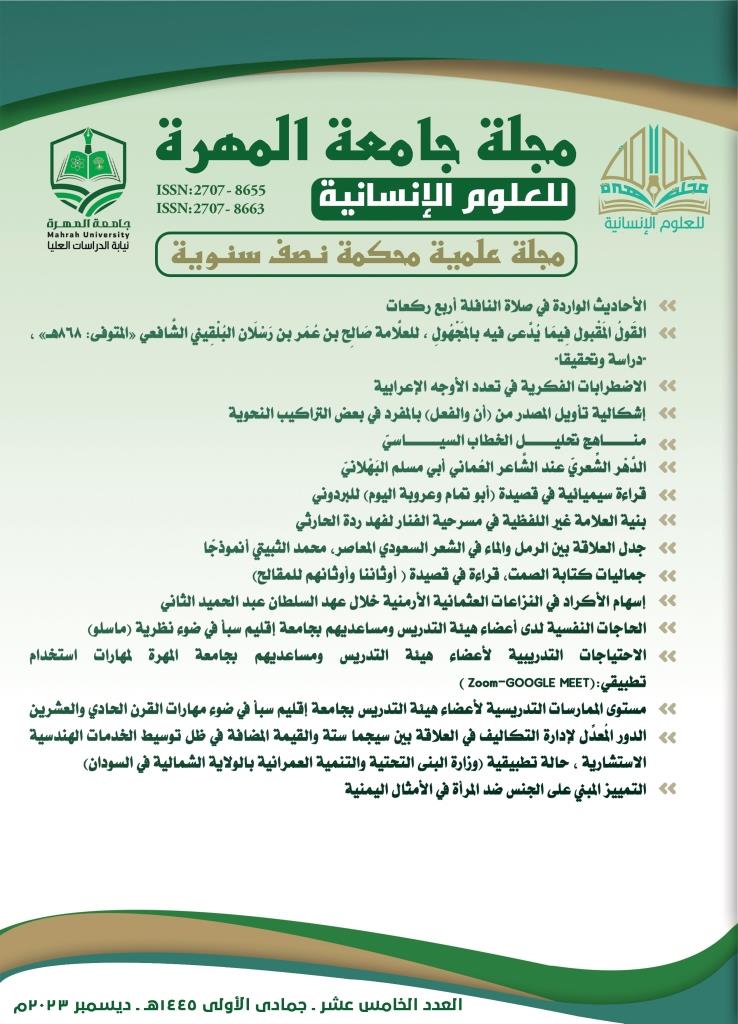مستوى الممارسات التدريسية لأعضاء هيئة التدريس بجامعة إقليم سبأ في ضوء مهارات القرن الحادي والعشرين
DOI:
https://doi.org/10.71311/.v4i2.125الكلمات المفتاحية:
الممارسات التدريسية، أعضاء هيئة التدريس، مهارات القرن الحادي والعشرينالملخص
هدف البحث الى تقييم مستوى الممارسات التدريسية لدى أعضاء هيئة التدريس بجامعة إقليم سبا في ضوء مهارات القرن الحادي والعشرين ومعرفة أثر التخصص على مستوى هذه الممارسات.
ولتحقيق ذلك اتبع البحث المنهج الوصفي، حيث قام الباحثان بتطوير استبانة مكونة من (44) فقرة تعكس قائمة مستوى الممارسات التدريسية لدى أعضاء هيئة التدريس بجامعة إقليم سبا في ضوء مهارات القرن الحادي والعشرين مضمنة في ثلاثة مجالات رئيسة وهي: (مهارات التعلم والابتكار والإبداع - مهارات الثقافة الرقمية والإعلام –مهارات الحياة والمهنة)، وبعد التحقق من صدقها وثباتها، تم توزيعها إلكترونيا على عينة البحث المكونة من(66) فرداً، وهم رؤساء الأقسام وعمداء الكليات والمراكز ونوابهم ورئاسة الجامعة، كونهم المسؤولين المباشرين عن أعضاء الهيئة التدريسية في الجامعة، وقد تم إجراء التحليلات الإحصائية المناسبة.
وتوصلت النتائج الى أن درجة مستوى الممارسات التدريسية لدى أعضاء هيئة التدريس الجامعي في ضوء مهارات القرن الحادي والعشرين جاءت بدرجة عالية بصفة عامة، كما بينت نتائج البحث عدم وجود فروق ذات دلالة إحصائية في استجابات عينة البحث حول مستوى ممارسات أعضاء هيئة التدريس الجامعي في ضوء مهارات القرن الحادي والعشرين، تعزي لمتغيرات التخصص. وفي ضوء نتائج البحث قدم الباحثان عددا من التوصيات والمقترحات أهمها الاهتمام بالتنمية المهنية لأعضاء هيئة التدريس وفق احتياجات مدروسة.
The research aimed to evaluate the level of teaching practices of faculty members at the university of Saba Region in the light of the 21th century skills. As well as, it aimed to discover the impact of the major for these practices.
For achieving that, the research adopted the descriptive method. The researchers used a questionnaire consisting of (44) statements that clarified the list of teaching practices level of faculty members at university of Saba Region in the light of the 21th century skills. The questionnaire consisted of three main domains: (the first domain was: learning, innovation, and creativity skills), (the second domain was: digital knowledge and media skills), (the third domain was: life and profession skills). After verifying its reliability and validity, it was distributed electronically to the research’s sample which consisted of (66) member. They were the heads of departments, deans of faculties, their deputies, and the presidency of the university as they were the direct officials of the faculty members of the university. Then, appropriate statistical analyses were conducted.
The research resulted that, the degree of teaching practices level of the faculty members at the university, in the light of the 21th century skills, was in a high degree in general. Also, the research pointed out that, there were no statistically significant differences in the sample’s responses about the level of practices of faculty members at the university in the light of the 21th century skills related to specialization variables. Under the results, the researchers presented several suggestions and recommendations. The most important one was paying attention to the professional development for faculty members according to examined needs.
التنزيلات

التنزيلات
منشور
كيفية الاقتباس
إصدار
القسم
الرخصة
:حقوق الطبع والنشر والترخيص
يحتفظ الباحثون بحقوق النشر. ويتم ترخيص البحوث بموجب ترخيص Creative Commons CC BY 4.0 المفتوح، مما يعني أنه يجوز لأي شخص تنزيل البحث وقراءته مجانًا. وإعادة استخدام البحث واقتباسه شريطة أن يتم الإشارة إلى المصدر الأصلي. تتيح هذه الشروط الاستخدام الأقصى لعمل الباحث وعرضه.

